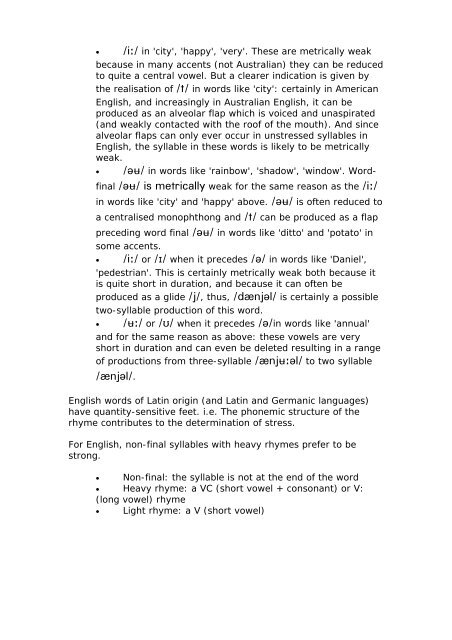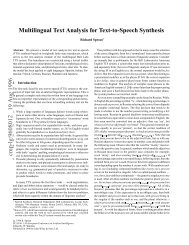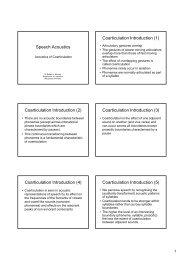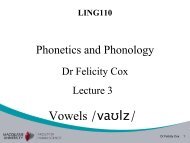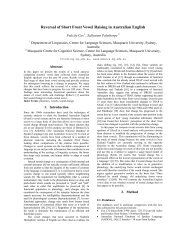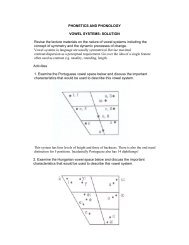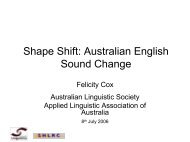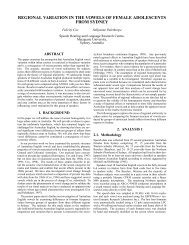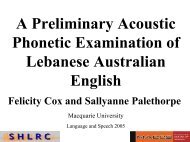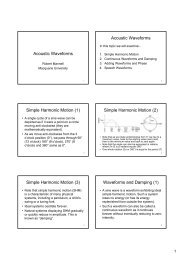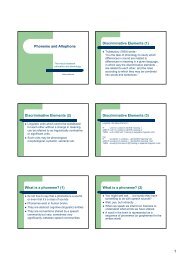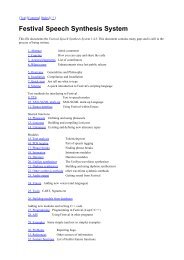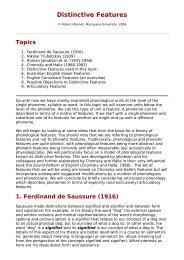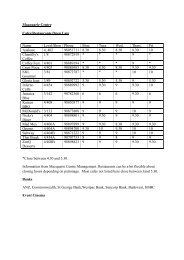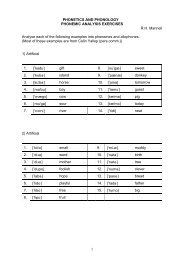The Syllable and the Foot : Summary - Speech Resource Pages
The Syllable and the Foot : Summary - Speech Resource Pages
The Syllable and the Foot : Summary - Speech Resource Pages
You also want an ePaper? Increase the reach of your titles
YUMPU automatically turns print PDFs into web optimized ePapers that Google loves.
• /iː/ in 'city', 'happy', 'very'. <strong>The</strong>se are metrically weak<br />
because in many accents (not Australian) <strong>the</strong>y can be reduced<br />
to quite a central vowel. But a clearer indication is given by<br />
<strong>the</strong> realisation of /t/ in words like 'city': certainly in American<br />
English, <strong>and</strong> increasingly in Australian English, it can be<br />
produced as an alveolar flap which is voiced <strong>and</strong> unaspirated<br />
(<strong>and</strong> weakly contacted with <strong>the</strong> roof of <strong>the</strong> mouth). And since<br />
alveolar flaps can only ever occur in unstressed syllables in<br />
English, <strong>the</strong> syllable in <strong>the</strong>se words is likely to be metrically<br />
weak.<br />
• /əʉ/ in words like 'rainbow', 'shadow', 'window'. Word-<br />
final /əʉ/ is metrically weak for <strong>the</strong> same reason as <strong>the</strong> /iː/<br />
in words like 'city' <strong>and</strong> 'happy' above. /əʉ/ is often reduced to<br />
a centralised monophthong <strong>and</strong> /t/ can be produced as a flap<br />
preceding word final /əʉ/ in words like 'ditto' <strong>and</strong> 'potato' in<br />
some accents.<br />
• /iː/ or /ɪ/ when it precedes /ə/ in words like 'Daniel',<br />
'pedestrian'. This is certainly metrically weak both because it<br />
is quite short in duration, <strong>and</strong> because it can often be<br />
produced as a glide /j/, thus, /dænjəl/ is certainly a possible<br />
two-syllable production of this word.<br />
• /ʉː/ or /ʊ/ when it precedes /ə/in words like 'annual'<br />
<strong>and</strong> for <strong>the</strong> same reason as above: <strong>the</strong>se vowels are very<br />
short in duration <strong>and</strong> can even be deleted resulting in a range<br />
of productions from three-syllable /ænjʉːəl/ to two syllable<br />
/ænjəl/.<br />
English words of Latin origin (<strong>and</strong> Latin <strong>and</strong> Germanic languages)<br />
have quantity-sensitive feet. i.e. <strong>The</strong> phonemic structure of <strong>the</strong><br />
rhyme contributes to <strong>the</strong> determination of stress.<br />
For English, non-final syllables with heavy rhymes prefer to be<br />
strong.<br />
• Non-final: <strong>the</strong> syllable is not at <strong>the</strong> end of <strong>the</strong> word<br />
• Heavy rhyme: a VC (short vowel + consonant) or V:<br />
(long vowel) rhyme<br />
• Light rhyme: a V (short vowel)


